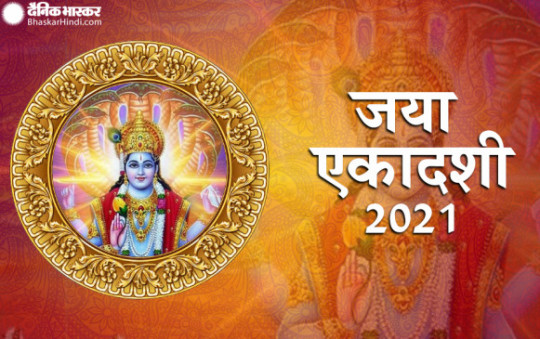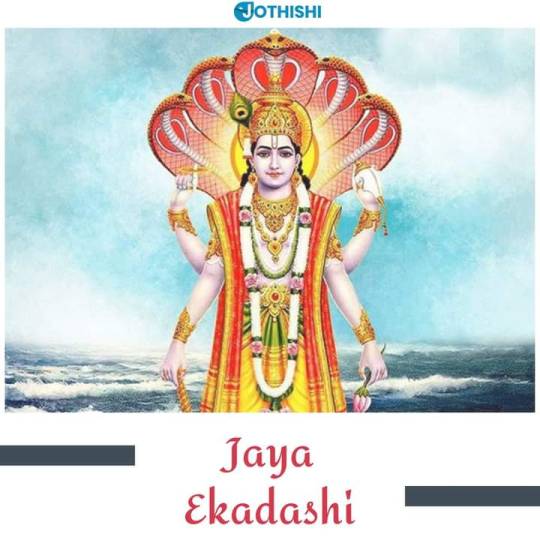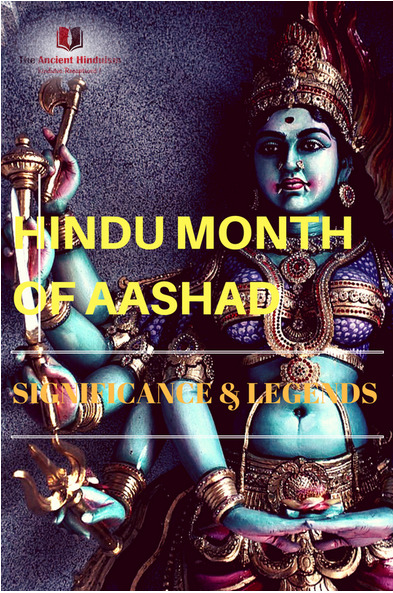#Jaya Ekadashi Importance
Explore tagged Tumblr posts
Text
Jaya Ekadashi 2024: Jaya Ekadashi Significance, Puja, Vrat, Katha And Importance Of Charity
Discover the significance of Jaya Ekadashi 2024! Explore its rituals including Jaya Ekadashi Puja, Vrat, and Katha, while delving into the profound importance of charity on this auspicious day.
#Jaya Ekadashi Significance#Jaya Ekadashi Puja#Jaya Ekadashi Vrat Katha#Jaya Ekadashi Importance Of Charity#2024 Jaya Ekadashi Vrat Katha#Jaya Ekadashi 2024
1 note
·
View note
Text
Jaya Ekadashi 2024 Vrat Niyam: 20 फरवरी को जया एकादशी का व्रत, जाने व्रत से जुड़े नियमJaya Ekadashi 2024 Vrat Niyam: सनातन धर्म में एकादशी तिथि पर व्रत और पूजा का अत्यधिक महत्व बताया गया है। पुराणों में माघ माह को अत्यंत शुभ बताया गया है।
#Jaya ekadashi#jaya ekadashi 2024#jaya ekadashi 2024 date#jaya ekadashi vrat 2024#jaya ekadashi vrat 2024 date#jaya ekadashi vrat 2023 puja muhurat#jaya ekadashi vrat 2024 puja time#jaya ekadashi vrat 2024parana time#jaya ekadashi vrat importance#Dharm News in Hindi#Vrat News in Hindi#Vrat Hindi News
0 notes
Text
Jaya Ekadashi 2025: Know the Time, Date, and Significance
Jaya Ekadashi, a highly auspicious day for Hindus, is observed on the 11th day of the bright fortnight (Shukla Paksha) in the month of Magha according to the Hindu lunar calendar. This Ekadashi holds immense spiritual importance and is considered a day to cleanse the mind and soul through fasting, prayer, and devotion. In 2025, Jaya Ekadashi will be celebrated on 8 February 2025, Saturday. In…
0 notes
Text
जया एकादशी कल: जानें इस तिथि का महत्व और पूजा का शुभ मुहूर्त

माघ मास के शुक्ल पक्ष की एकादशी तिथि को जया एकादशी व्रत रखा जाता है। इसे अजा तथा भीष्म एकादशी भी कहते हैं। इस दिन भग��ान विष्णु की विधि-विधान से पूजा की जाती है। इस साल जया एकादशी 23 फरवरी, मंगलवार को है। मान्यता है कि इस एकादशी के उपवास से व्यक्ति को हर तरह के पापों से मुक्ति मिलती है और वह मोक्ष को पा लेते हैं। जया एकादशी के दिन भगवान विष्णु की पूजा करने का विधान है।
#Jaya Ekadashi#Jaya Ekadashi 2021#Jaya Ekadashi Importance#Jaya Ekadashi Puja#Jaya Ekadashi Muhurat#Lord Vishnu Puja#Dharm News#Bhaskar Hindi#Dainik Bhaskar Hindi#Hindi News#BhaskarHindiNews
0 notes
Text
Jaya Ekadashi is celebrated every year on the Ekadashi of Shukla Paksha in the month of Magha. Lord Vishnu is worshipped on this day. The importance of this fast has been told in Purana that by observing Jaya Ekadashi vast, one gets freedom from all sins. All the material and spiritual pleasures are also met in life.
.
.
.
.
.
.
#ekadashi #ekadashispecial #putradaekadashi #shravanaputradaekadashi #fasting #hindurituals #sanatanadharma #lordvishnu #saraswati #laxmi #hindufestival #jayaekadashi #jayaekadashi🕉️

0 notes
Text
Eleventh
Eleventh
Eleventh day of the lunar month - The eleventh day of the decline or increase of the eleventh moon. Krishnapaksha's Ekadashi is called Krishna Ekadashi and Shuklapaksha's Ekadashi is called Shukla Ekadashi. When certain special constellations are connected on the eleventh day, they are called Jaya-Vijaya-Jayanti and Papanashini. However, there are 24 names of the eleven. These are Utpanna, Mokshada, Safala, Putrada, Sattila, Jaya (earthly), Vijaya, Amalki (Ala), Papamochani, Kamada, Baruthini, Mohini, Apara, Nirjala or Bhimaseni, Yogini, Harishayani (Padma), Kama. Putrada, Aja, Padma (Putrada), Indira, Papankusha, Rambha and Prabodhini.
Ekadashi vows-- Ekadashi is a sacred ritual of the Hindus. Usually the widows of the Brahmins are obliged to observe the 24th Ekadashi. In addition, Ekadashi has been recognized as one of the most important public rituals in the whole of India in its clever and self-sacrificing religious practices. The great purpose of our religious tradition is to save sins for the sake of rebirth by destroying the sins we have committed knowingly or unknowingly in our lives - to think that sin can be freed by Ekadashi? Not to mention. This includes the practice of daily vows, casual vows and sexual vows. In the classical sense, the Chandrayan vow is called a regular vow, and it removes the sins of the past. Happiness and good fortune are attained in the Kamya Brat like Oshabrata. But like Ekadashi, virtue is saved in daily vows. Some of the Ekadashi are celebrated by eating together or at other times, while others have the rule of completely abandoning food and water. On the eleventh day, one should be pure in body and mind, and abstain from eleven, such as sports, sleep, alcohol, slander, jealousy, theft, violence, lust, anger, and untruth. Only the Shukla Ekadashi and the Banaprastha monks and widows can do Ekadashi in the son's house. From a scientific point of view, celebrating Ekadashi relaxes the stomach and activates the digestive system. The result is protection from indigestion, constipation, and inflammation.
0 notes
Text
Jaya Ekadashi 2021: Significance, Tithi And All About Ekadashi Vrat
Jaya Ekadashi 2021: Significance, Tithi And All About Ekadashi Vrat
Jaya Ekadashi 2021: Today is Jaya Ekadashi. People who observe Jaya Ekadashi worship Lord Vishnu with dedication to seek his eternal blessings. Fasting is a very important part of Ekadashi. According…
View On WordPress
0 notes
Link
Today is Ekadashi & today's Ekadashi is called as Jaya Ekadashi. Today let us know what is the meaning and greatness of Ekadashi. Why we need to fast only on Ekadashi. What are the benefits of fasting on Ekadashi & many many more other very important aspects. Let us become dear to Sri Hari today:
0 notes
Text
HINDU MONTH OF : AASHAD {aashad maas / aashada masam/aadi masam}

Ashadha - Ashadha is the 4th lunar month in Hindu calendar. In Hindu Calendar, there are two methods to mark the lunar month. In one, lunar month is marked from Purnima to Purnima (known as Purnimanta calendar) and in other lunar month is marked from Amavasya to Amavasya (known as Amanta calendar). AASHAD TIMELINE is usually from Mid july to Mid august
This is the monsoon season in India and the nature starts to throb again in life with the rain drops. The summer makes everything lifeless, whether it is the nature or the animal kingdom. With the first drops of the rain, everyone starts enjoying the monsoon season. So, this is the most important significance of ashada masam that it brings new life to the nature.
While Aashaada masam is considered as inauspicious for mundane activities, it is considered as sacred month for performing spiritual activities. Aashada, Karthika, Maagha and Vaisakha are regarded as spiritually important months in Hindu lunar calendar. Aashada masam is the month when the rains (monsoon) will start afresh and a number of creatures (living beings) will sprout on the earth. This month is said to be the appropriate period for sprouting of spiritual knowledge in the minds of human beings.
SHAKTI WORSHIP DURING AASHAD :

Aashad maas is specially dedicated to Mother Goddess Shakti - the universal feminine cosmic energy believed to be the source of all creation & destruction. Mondays, Tuesdays and Fridays are the most important days where grand pujas and rituals will be performed in almost all the hindu temples of the mother goddess. All Fridays, especially the 1st and 3rd Friday of Aashad are considered very auspicious.
LIST OF FESTIVALS CELEBRATED IN AASHAD MONTH
YOGINI EKADASHI- Yogini Ekadashi is one of the twenty four Ekadashi vrats which are observed to seek blessing of Lord Vishnu.
JAGANNATH RATHYATRA - Jagannath Rathyatra is a huge Hindu festival associated with Lord Jagannath held at Puri in the state of Orissa.
DEVSHAYANI EKADASHI - Devshayani Ekadashi is one of the twenty four Ekadashi vrats which are observed to seek blessing of Lord Vishnu.
GURU PURNIMA / VYASA PUJA - Guru Purnima is a festival traditionally celebrated by Hindus. On this day, disciples offer puja or pay respect to their Guru. Full Moon day in Aashaada masam known as Guru Pournima is celebrated across the country, symbolically honouring the Gurus and teachers who have taught us the Vidya. This day is also popularly referred to as Vyaasa Poornima associated with Lord Veda Vyaasa, the Divine Literary incarnation of Lord Sri Maha Vishnu. It is believed that Sri Veda Vyasa was born on this day of Pournami in the Lunar month of Aashaada. It is also said that it is the day on which Sri Veda Vyasa commenced his work on Brahma Sutras.
GAURI VRAT- Gauri Vrat is significant fasting period dedicated to Goddess Parvati. This Gauri Vrat is mainly observed in Gujarat.
JAYA PARVATI VRAT - Jayaparvati Vrat is significant fasting period dedicated to Goddess Jaya, a form of Goddess Parvati. Jayaparvati Vrat is mainly observed in Gujarat.
KOKILA VRAT - Kokila Vrat is dedicated to Goddess Sati and Lord Shiva. The name Kokila refers to Indian bird cuckoo and is associated with Goddess Sati.
SIGNIFICANCE & REASONS ~
Some believe that Lord Surya (Sun god) changes his direction from north to south in the Aadi month. The next six months from Aadi to Margazhi is symbolically the night time of the Devas (Dakshinayana punyakalam). Hence many auspicious events like marriage and house warming are not performed during the month. New ventures are not begun fearing failure to yield desired results. However,the real reason may be that such a practice was adopted just to help future generations focus on worship of Shakti and not be distracted by such events. This may have also been done to focus all efforts on the new agrIcultural season.
THE BRIDE SENT TO HER MATERNAL HOME :

There is also a popular custom of Newly weds not allowed to stay together. As this will be the hottest period in India and it will not be suitable for the health of the mother and child. Today, with modern medical facilities this particular custom is not strictly followed.In ancient times, in Ashada Masam, newly married couples were not allowed to stay together in Andhra Pradesh and Karnataka states of India. This was because if the woman conceived in Ashada Masam , then she will be giving birth in March or April or May the hottest months in South India. This is the hottest period in India and it is not suitable for the health of the mother and child. Since in ancient times there were no immediate medical facility, elders asked couples to stay apart. The prime reason was that sometimes it was not possible to contain bleeding in hot months. But a question arises, why this is done only for new couples.There is an explanation for this which goes that - , after first delivery, the lady will have experience of giving birth so she may not feel so difficult as her first delivery. Also, during the month of Aashad , there will be festivals for goddess shakti . So ladies keep fast abstaining themselves from being with partner t& maintain sancity up until they finish the fast ,even after years of marriage.
There are also many who believe that the daughter-in-law and the mother-in-law should not stay together in this month. However ,there is no astrological significance to this.
This year Aashad Maas /Aadi masam/ Aashada masam lasts as follows :
NORTHERN INDIA : JUNE 10th 2017 - JULY 9th 2017 SOUTHERN INDIA : JUNE 24th 2017 TO JULY 23rd 2017
THE FULL CALENDER OF Aashad month will be posted soon on our Facebook page dedicated to Mother Goddess .Click here - OM SHAKTI - Om Krim Kali
14 notes
·
View notes
Text
जया एकादशी 2024 : पूजा विधि, धार्मिक मान्यताएं और दान का महत्व
#importance of jaya ekadashi#jaya ekadashi 2024#jaya ekadashi significance#jaya ekadashi date and time
1 note
·
View note
Text
Jaya Ekadashi 2024 Date: 20 या 21 फरवरी कब है जया एकादशी, जानें सही तारीखJaya Ekadashi 2024 Vrat and Puja Vidhi: पुराणों में माघ माह को बहुत ही शुभ माह माना गया है। इस माह में स्नान और दान करना बहुत शुभ माना जाता है।
#Jaya ekadashi#jaya ekadashi 2024#jaya ekadashi 2024 date#jaya ekadashi vrat 2024#jaya ekadashi vrat 2024 date#jaya ekadashi vrat 2023 puja muhurat#jaya ekadashi vrat 2024 puja time#jaya ekadashi vrat 2024parana time#jaya ekadashi vrat importance#Dharm News in Hindi#Vrat News in Hindi#Vrat Hindi News
1 note
·
View note
Text
Jaya Ekadashi 2025: Date, Significance, and the Importance of Donation

Jaya Ekadashi is one of the most auspicious Ekadashi observances in the Hindu calendar. Falling in the Magha month, it is believed to cleanse sins and bring spiritual progress. In Jaya Ekadashi 2025 Date, devotees will observe fasting and engage in charitable activities to seek blessings from Lord Vishnu.
Significance of Jaya Ekadashi
The Jaya Ekadashi holds immense spiritual value, as it is said to grant liberation from past sins and elevate one’s soul to higher consciousness. Observing a fast on this day is believed to remove all obstacles in life and ensure prosperity and happiness. Devotees engage in prayers, bhajans, and donations to spread positivity and seek divine grace.
Jaya Ekadashi 2025 Observance
Jaya Ekadashi 2025 will be observed with great devotion by millions across India. Devotees follow strict fasting rituals, refraining from grains and certain foods, and spend the day chanting Vishnu Sahasranama and other devotional hymns. The day holds special significance for those seeking to purify their mind, body, and soul through prayers and acts of kindness.
The Importance of Charity on Jaya Ekadashi
Donation and charity play a crucial role in this sacred observance. Offering food, clothing, and financial aid to the needy is considered highly meritorious. Organizations like Narayan Seva Sansthan actively participate in helping the underprivileged, aligning with the spirit of giving on Jaya Ekadashi. By contributing to noble causes, devotees can fulfill their spiritual duties and bring joy to those in need. If you wish to be part of this noble act, you can donate and make a difference in someone’s life.
Learn More About Jaya Ekadashi
For an in-depth understanding of the rituals, traditions, and mythological significance of Jaya Ekadashi significance, visit Narayan Seva Sansthan’s resources. You can also explore the Hindi article on What is Jaya Ekadashi 2025 to gain more insights.
Jaya Ekadashi is not just a day of fasting but an opportunity to uplift oneself spiritually and serve humanity. Let’s celebrate this sacred occasion with devotion, good deeds, and an open heart to help those in need.
#JayaEkadashi2025#JayaEkadashi#JayaEkadashiMahatva#JayaEkadashiImportance#SignificanceOfJayaEkadashi#HinduFestivals#EkadashiFasting#LordVishnu#SpiritualGrowth#EkadashiVrat#CharityOnEkadashi#DonateForGood#NarayanSevaSansthan#HinduRituals#ReligiousObservance
0 notes